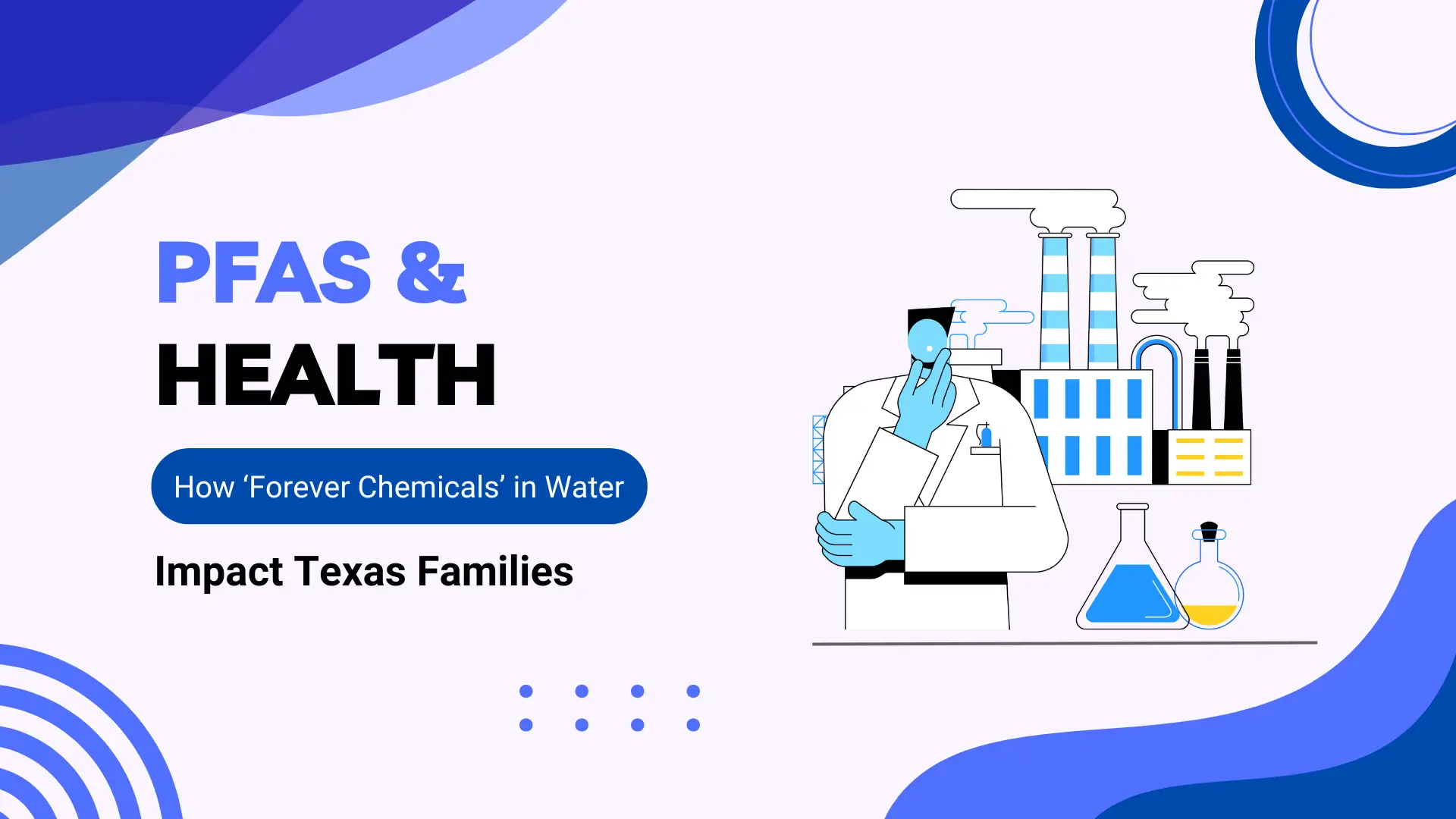Water is the lifeblood of every Texas home. From the glass you pour at dinner, to the morning shower before work, to the washing machine that scrubs the dust off your kid’s baseball uniform—clean water is essential. But for many Texas families, that water is carrying hidden contaminants: hard water minerals, chlorine, and perhaps most concerning, PFAS—so-called “forever chemicals.” These aren’t just technical terms; they affect real lives, real health, and real homes across Texas.
In this article, we’ll take a detailed, approachable look at PFAS in Texas water, why hard water and chlorine matter too, and what families can do about it. We’ll cover health impacts, appliance damage, local concerns, and practical solutions. Along the way, we’ll also show how companies like Aqua Pure are helping Texans safeguard their water with customized, family-friendly solutions.
What’s in Texas Water? Understanding the Common Contaminants
Texas is massive, and so are its water challenges. Depending on whether your water comes from an aquifer in West Texas, a reservoir in East Texas, or the Gulf Coast, you could be dealing with different water quality concerns. Here are the most common contaminants Texans face:
1. Hard Water (Calcium and Magnesium)
- The Issue: Texas is famous for its hard water. Minerals like calcium and magnesium dissolve into the water as it flows through limestone-rich soil and aquifers.
- Health Effects: While not harmful to drink, hard water can irritate sensitive skin, worsen eczema, and leave hair feeling rough or brittle.
- Impact on Home: Over time, hard water forms limescale deposits inside pipes and appliances like dishwashers, water heaters, and washing machines. This buildup reduces efficiency, increases energy bills, and shortens appliance lifespans. Soap and detergent also don’t lather properly in hard water, meaning you end up using more.
2. Chlorine and Chloramine
- The Issue: Municipal water treatment plants across Texas add chlorine or chloramine to kill bacteria and viruses.
- Health Effects: While effective for disinfection, chlorine can dry out skin, irritate eyes, and create an unpleasant taste and odor. Chloramine, a chlorine-ammonia compound, can trigger respiratory irritation for sensitive individuals.
- Impact on Home: Chlorine accelerates corrosion of plumbing fixtures and rubber seals in appliances, leading to leaks and repairs.
3. PFAS (Per- and Polyfluoroalkyl Substances)
- The Issue: PFAS are synthetic chemicals used in products like non-stick cookware, firefighting foam, stain-resistant fabrics, and fast-food wrappers. They are extremely durable and resist breaking down in the environment.
- Health Effects: Long-term exposure has been linked to cancers, thyroid disease, developmental issues in children, reduced fertility, high cholesterol, and weakened immune response. The EPA and health agencies now consider PFAS one of the most serious emerging contaminants.
- Impact on Home: Unlike hard water, PFAS don’t leave visible signs. They silently contaminate drinking water and accumulate in the body over time.
PFAS in Texas: A Growing Concern
PFAS contamination isn’t limited to faraway places—it’s here in Texas. Testing has revealed PFAS in multiple water systems across the state. Communities near military bases, airports, or industrial sites often report higher PFAS levels due to the use of PFAS-containing firefighting foams.
In Houston, for example, PFAS testing has drawn concern due to industrial activity along the Ship Channel. In North Texas, areas near former military training sites have also seen contamination alerts. For rural Texans relying on private wells, the risks are even greater because private wells often go untested.
Why are PFAS such a big deal? Because they are nicknamed “forever chemicals” for a reason. They don’t naturally break down, they resist heat and water, and once they enter the body, they accumulate for years. Even small doses matter.
How These Contaminants Affect Texas Families
To understand the real-world impact, let’s look at the day-to-day issues Texas families experience:
- Parents of young children: Worry about PFAS exposure affecting growth, immune health, and long-term development.
- Families with allergies or sensitive skin: Suffer dry, itchy skin and irritation from chlorine and hard water.
- Homeowners: Frustration over constant repairs and replacement of water heaters, dishwashers, and faucets due to limescale buildup.
- Health-conscious households: Concerns over chlorine byproducts and cancer-linked PFAS in their drinking water.
- Seniors: Heightened vulnerability to the health risks of long-term chemical exposure.
How to Protect Your Home and Health: Testing and Treatment
The first step is always testing your water. General city water reports are helpful but don’t reflect what’s coming out of your specific tap. A professional in-home water test can detect hardness levels, chlorine, and PFAS.
Companies like Aqua Pure offer free water testing for Texas families, providing a clear picture of what’s in your water.
Water Treatment Solutions for Texas Homes
- Water Softeners
- Target: Hardness minerals like calcium and magnesium.
- Benefits: Protects appliances, makes cleaning easier, softens skin and hair, saves money on soap.
- Explore Aqua Pure’s water softener solutions.
- Whole-House Filtration Systems
- Target: Chlorine, sediment, and certain organic chemicals.
- Benefits: No chlorine taste or smell, better water for bathing and cooking, healthier showers.
- Learn about Aqua Pure’s whole-house water treatment systems.
- Reverse Osmosis (RO) Systems
- Target: PFAS, heavy metals, nitrates, fluoride, and other chemical contaminants.
- Benefits: Pure drinking and cooking water right from your tap.
- Specialized PFAS Filtration
- Target: Removes PFAS using activated carbon or advanced membrane technology.
- Benefits: Provides peace of mind by addressing the hardest-to-remove contaminants.
Why Choose Aqua Pure?
Water treatment is not one-size-fits-all. That’s why Texans trust Aqua Pure. Here’s what sets them apart:
- Free Installation and Support: Certified technicians handle everything—no DIY headaches.
- Easy Financing: Affordable monthly plans without hidden costs.
- $0 Down Payment, Buy Now – Pay Later: Get safe water now without financial stress.
- Lifetime Warranty: A system built to last, backed by an industry-leading warranty.
- Texas Owned, Family Operated: Local expertise that understands Texas water challenges.
- 10+ Years of Trust: Serving Houston and beyond for over a decade.
- Customized Solutions: From whole-house systems to targeted filtration, every solution is tailored to your family’s needs.
Additional Tips for Texas Families
Beyond installing water treatment, here are simple steps to protect your health:
- Check your municipal water quality report annually.
- Inspect your appliances regularly for limescale and corrosion.
- Use filtered water for baby formula and cooking whenever possible.
- Flush faucets after periods of disuse to reduce exposure to stagnant water.
- Consider bottled water from trusted sources if you’re in a known PFAS contamination zone until filtration is installed.
FAQ: Common Texas Water Questions
Q: How do I test my water for PFAS?
A: Request a professional water test. Aqua Pure offers free testing for Texas families.
Q: Will boiling remove PFAS or chlorine?
A: Boiling may remove some chlorine but does not remove PFAS. Filtration is the only effective method.
Q: How can I tell if I have hard water?
A: Look for spots on dishes, dry skin after showers, and limescale around faucets. A test confirms hardness levels.
Q: Can Aqua Pure systems handle well water?
A: Yes. Aqua Pure provides customized solutions for both municipal and private well systems across Texas.
Q: Is chlorine safe to drink?
A: At municipal levels, chlorine is considered safe but often unpleasant. Many families prefer filtered water without chlorine.
Q: Do water softeners remove PFAS?
A: No. Water softeners are for minerals. For PFAS, you need reverse osmosis or activated carbon filtration.
Q: What’s the cost of a system?
A: Costs vary, but Aqua Pure offers $0 down financing, making solutions affordable without upfront payments.
Q: How long does installation take?
A: Typically, just a few hours. Aqua Pure handles everything from start to finish.
Final Thoughts
Texas families deserve clean, safe water—without worrying about forever chemicals, chlorine, or limescale destroying their home. PFAS contamination is a serious health concern, and hard water and chlorine are constant daily frustrations. But the solution is within reach.
With professional water testing and tailored treatment systems, you can protect your family’s health and extend the life of your appliances. Aqua Pure makes it simple, with free installation, $0 down financing, lifetime warranties, and Texas-owned expertise.
Don’t wait for health problems or costly appliance damage. Request your free water test today and take control of your family’s water—because clean water isn’t just a luxury, it’s a necessity for every Texas home.



